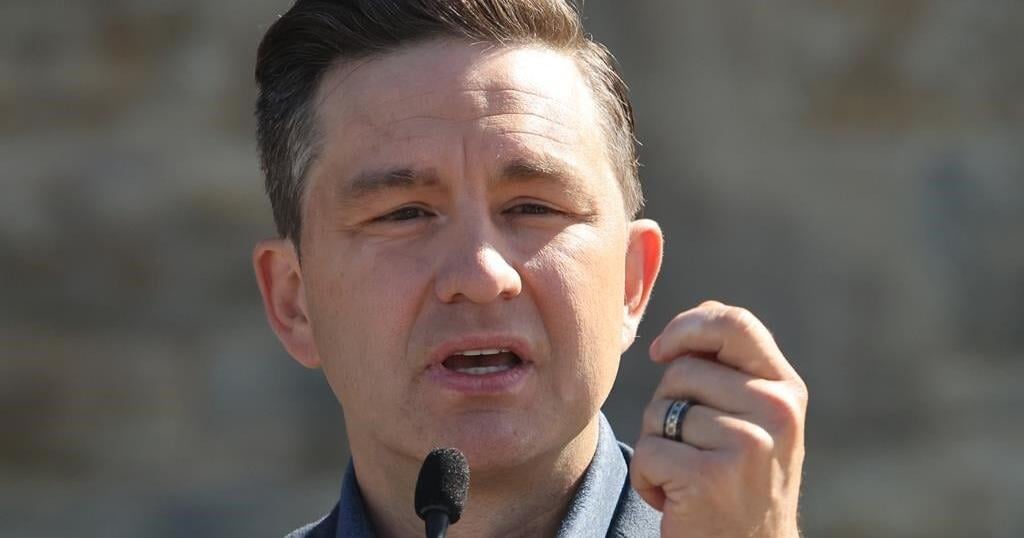HALIFAX – As Prime Minister Justin Trudeau digs in his heels and pledges to stay on as Liberal leader despite dwindling public support, some LGBTQ+ activists say he is putting queer and gender diverse people at risk.
Queer advocates say a Conservative government led by Pierre Poilievre would be dangerous for LGBTQ+ Canadians, and some are pushing for Trudeau to step aside to give the Liberals a better chance of winning the next election — which must be held on or before Oct. 20, 2025.
The executive director of the Newfoundland and Labrador Queer Research Initiative said she’s concerned about the potential harm of a Conservative government for queer Canadians. She pointed to Poilievre’s comments saying minors should not have access to puberty blockers and transgender athletes should be barred from women’s sports and change rooms.
“The normalization of this rhetoric is dangerous, and so are the potential policies that he could implement,” Sarah Worthman said.
Poilievre’s comments on change rooms and gender affirming care for young people serve to villainize trans people, Worthman said. “Poilievre has admitted on the record that he’s willing to use Section 33 — so there’s essentially no stopping him from rolling back different rights … especially the rights of trans and gender diverse people in Canada.”
Section 33 — known as the notwithstanding clause — of the Canadian Charter of Rights and Freedoms gives Parliament the ability to override certain portions of the Charter for a five-year term, but Poilievre’s office has said he would only use the clause for criminal justice reforms.
Meanwhile, Worthman said the Liberals would have a better chance of beating the Conservatives if they switched Trudeau out for someone new, but she didn’t say with whom. Worthman added that the federal NDP, led by Jagmeet Singh, would also benefit from a change in leadership.
The Conservatives did not provide someone for comment, but instead sent an email with a series of transcribed answers that Poilievre gave to journalists between June 2023 and February 2024 on LGBTQ+ issues.
The answers include Poilievre in 2023 saying Canada should continue offering refuge for persecuted LGBTQ+ people from around the world. They also include Poilievre in February saying “female spaces should be exclusively for females, not for biological males” when asked if transgender women should be barred from women’s sports or being admitted into women’s shelters or prisons.
At the time, the Tory leader also said he was opposed to youth under 18 taking puberty blockers, medicine often used by transgender youth to temporarily suppress the hormones that cause puberty.
Helen Kennedy, executive director of Egale Canada, said there has been a marked rise in hateful rhetoric about LGBTQ+ people in Canadian politics, which has left “members of our community to feel like they’re being hunted at the moment by their own political leaders.”
“Certainly not every conservative is anti-LGBTQ, but right at the moment it appears that the leader of the federal Conservative party is using this as a vote-getter,” she said. “It’s really based on political opportunism … and it’s really alarming.”
A Statistics Canada report released this year reported 491 hate crimes targeting sexual orientation in 2022, marking a 12 per cent rise from the previous peak recorded in 2021.
Fae Johnstone, executive director of political advocacy group Queer Momentum, said she’s worried a Poilievre government would roll back the hard-fought rights of trans Canadians. However, both Johnstone and Kennedy stopped short of calling for Trudeau to step down as leader.
“I think (Poilievre) wants to normalize government interference in the private lives of Canadian citizens under the guise of parental rights, or protecting people from gender ideology,” Johnstone said.
Montreal-based Celeste Trianon, who runs a centre that helps trans people in Quebec who wish to change their legal name or gender marker, said Poilievre’s comments on gender-affirming care for youth are cause for alarm.
“What I’m most fearful of is the criminalization of trans people,” Trianon said. She said she does not believe Poilievre’s assertion that he would use the notwithstanding clause only for criminal justice reforms.
“Having passports that match their chosen name, or access to gender-affirming health care — if that ends up being criminalized, which is possible with the use of the notwithstanding clause, it’s going to amount to a de facto ban on trans lives,” she said.
It’s for this reason that Trianon believes the Liberals should follow the lead of the U.S. Democratic party, which has seen a swell of support since replacing President Joe Biden with Vice-President Kamala Harris as the party’s nominee in November’s presidential election.
“I believe right now that’s what the Liberals need and, to a lesser degree, the NDP could benefit from this as well,” she said.
Randy Boissonnault, a federal cabinet minister who was previously Trudeau’s special adviser on LGBTQ+ issues, said in a recent interview queer people are right to be worried about what may happen if Poilievre wins the upcoming election.
“Poilievre has said that our rights, LGBTQ2S+ rights, are woke ideology. He has two members of his caucus who are part of the Canadian Pride caucus who do not come to meetings if we talk about trans matters,” he said.
Boissonnault, however, said Trudeau is the best person to lead the party though another election, adding that the prime minister is a champion of LGBTQ+ rights.
“We don’t need political leaders telling our trans community that they don’t belong … We have way too many LGBTQ2S+ plus kids that commit suicide simply because they think their lives are never going to get better. And I don’t stand for it and the prime minister doesn’t stand for it.”
This report by The Canadian Press was first published Sept. 4, 2024.

























